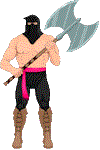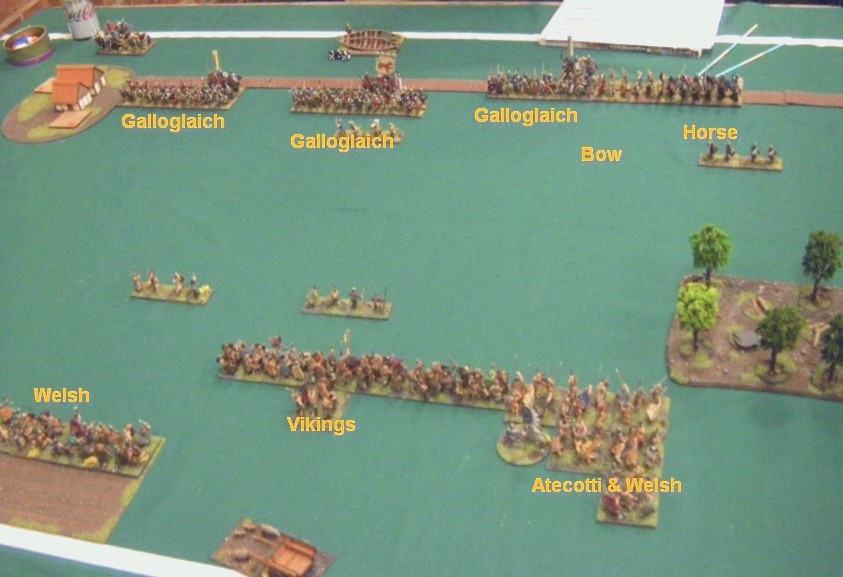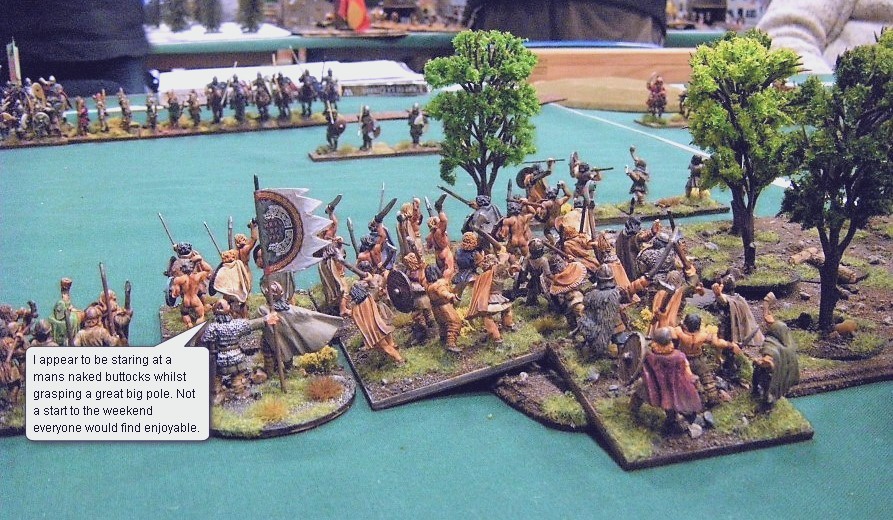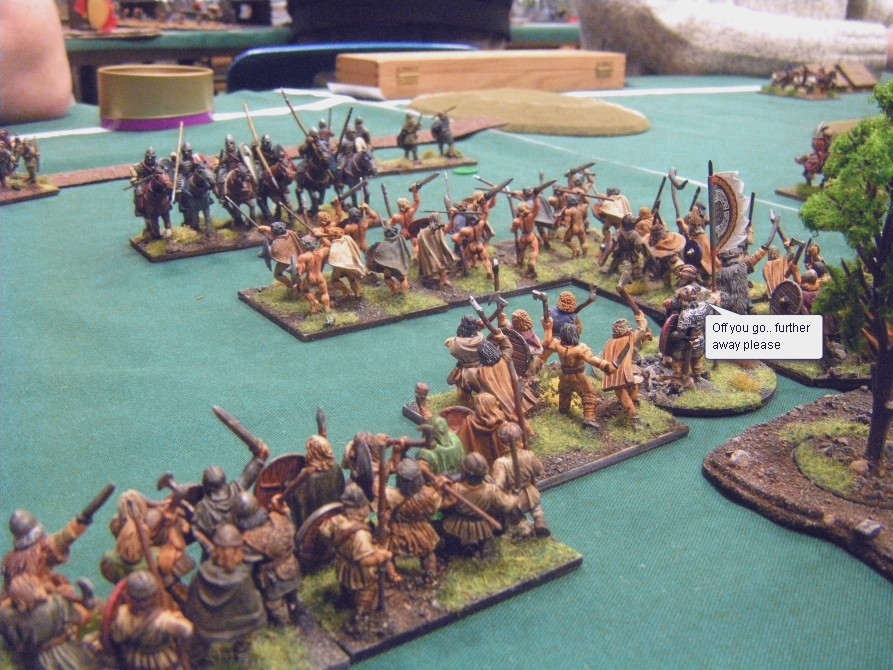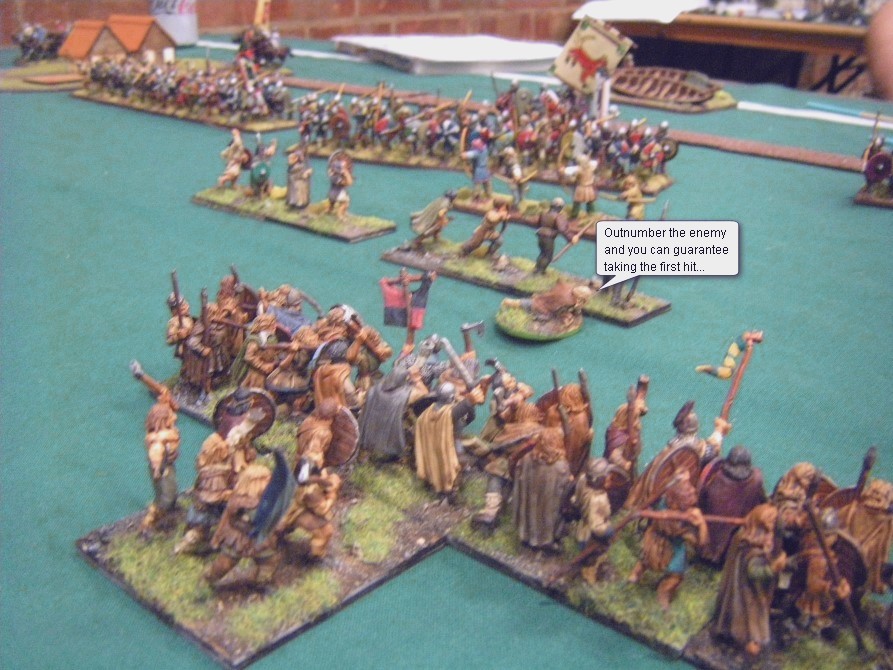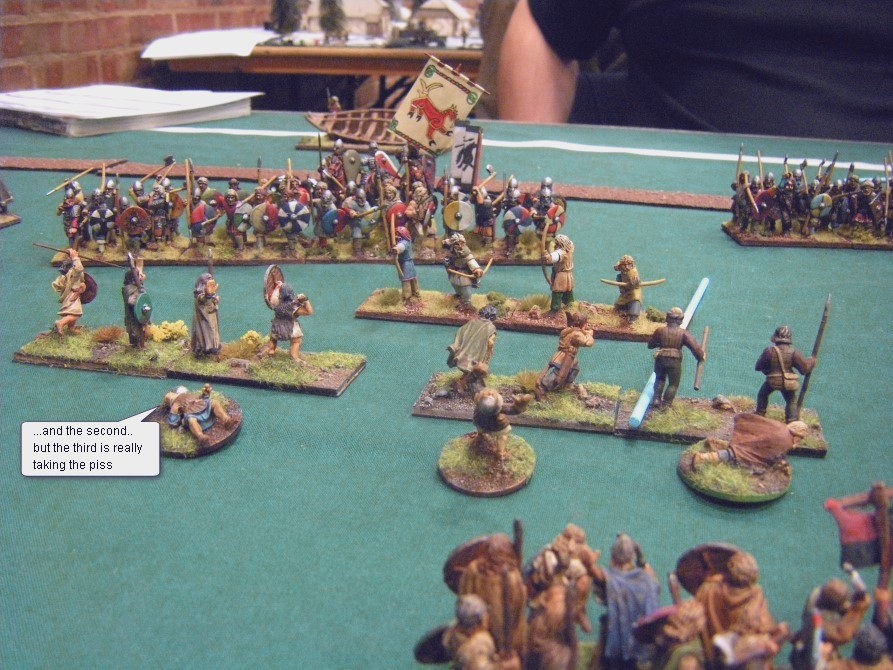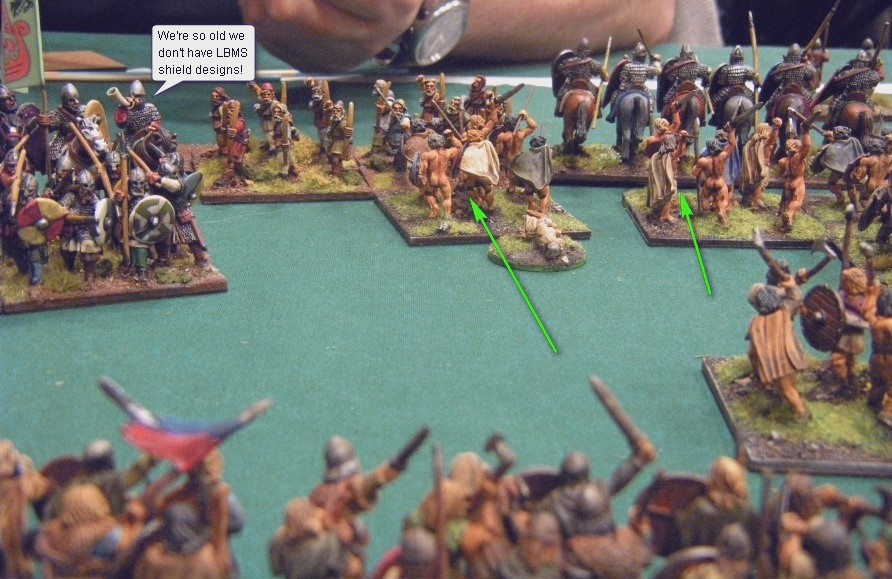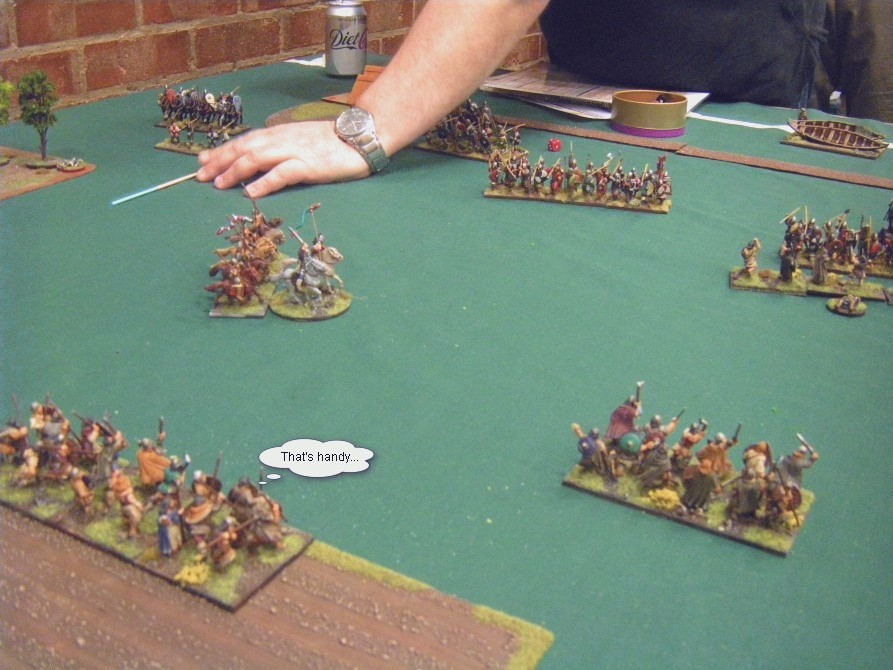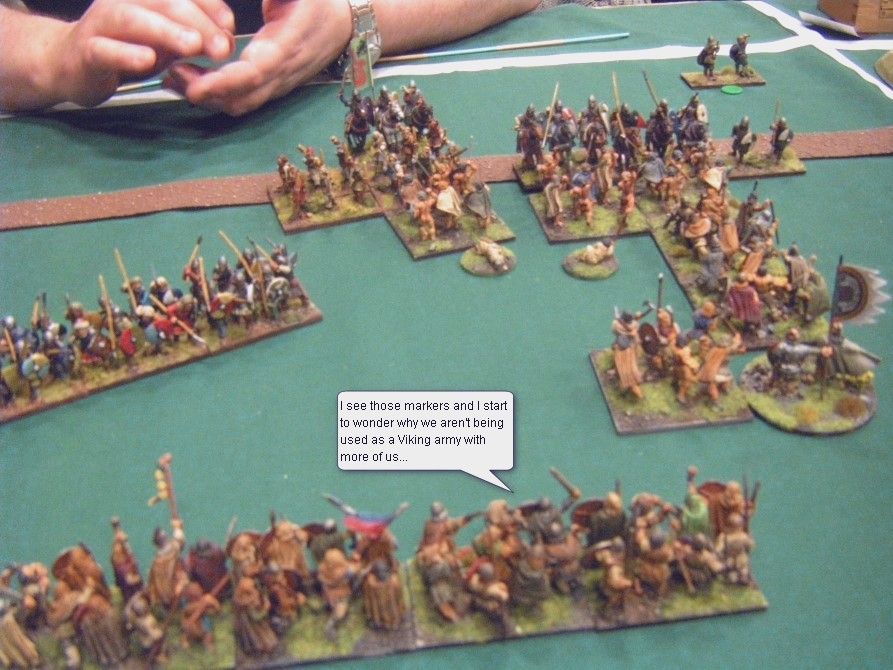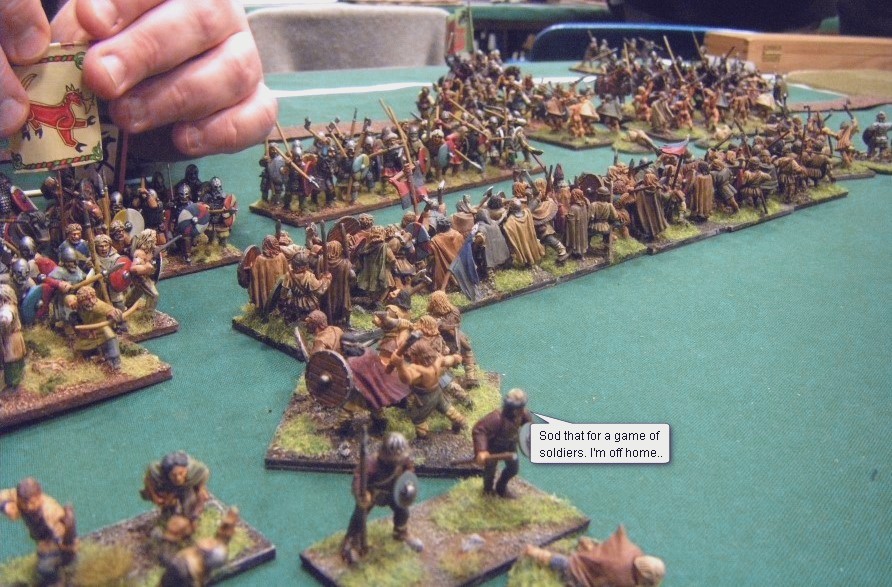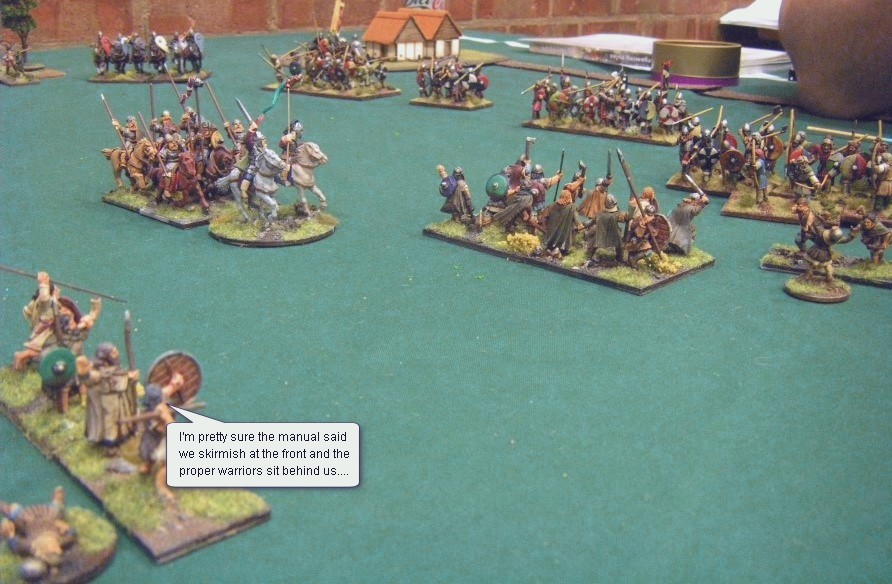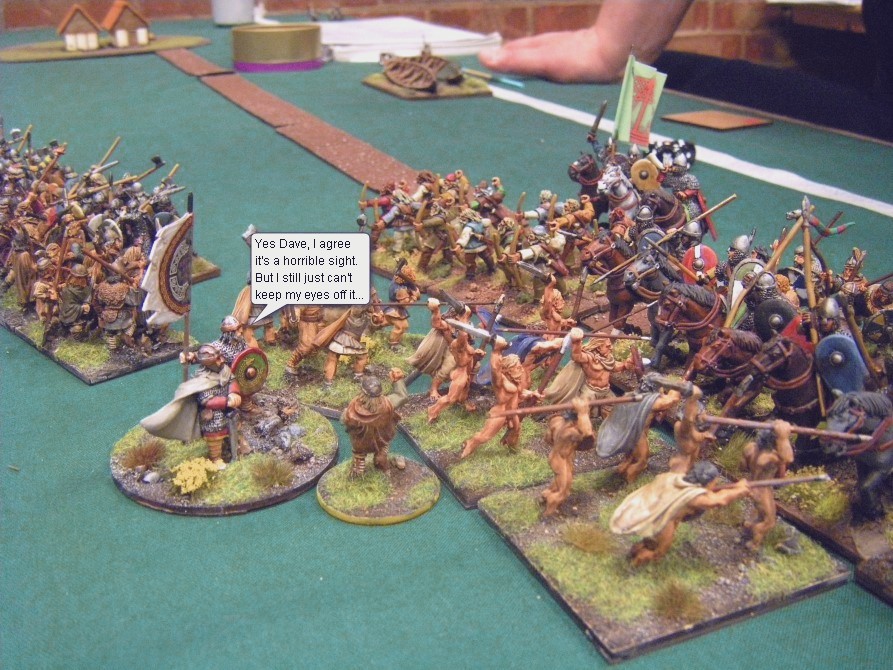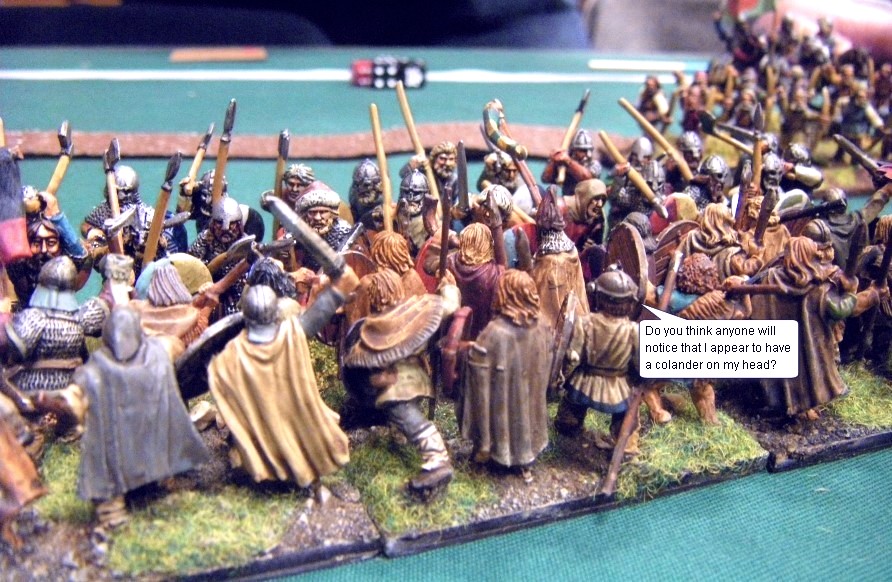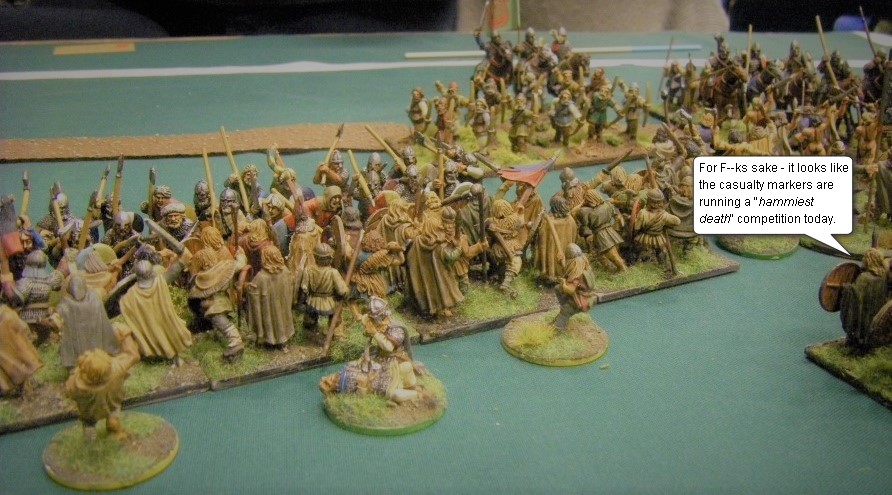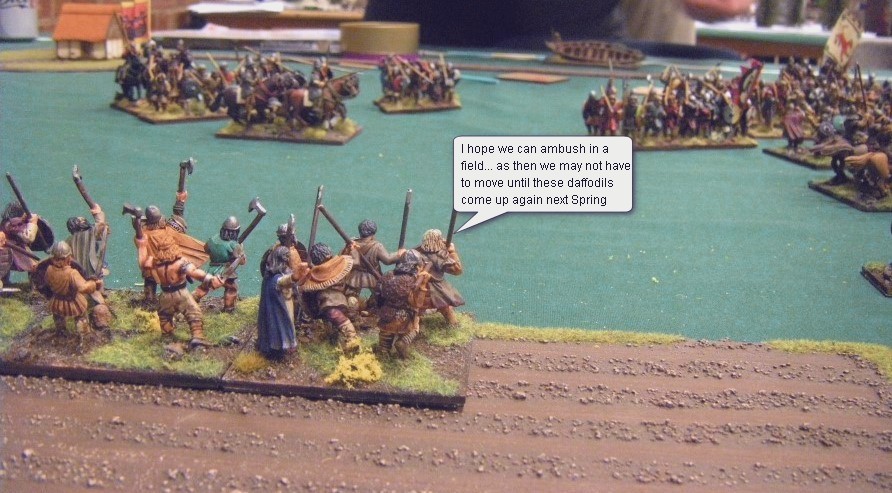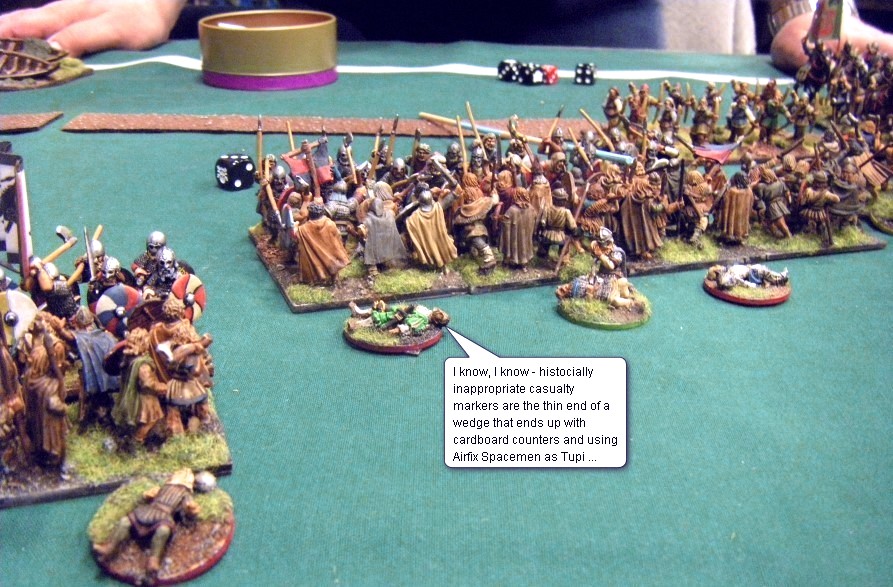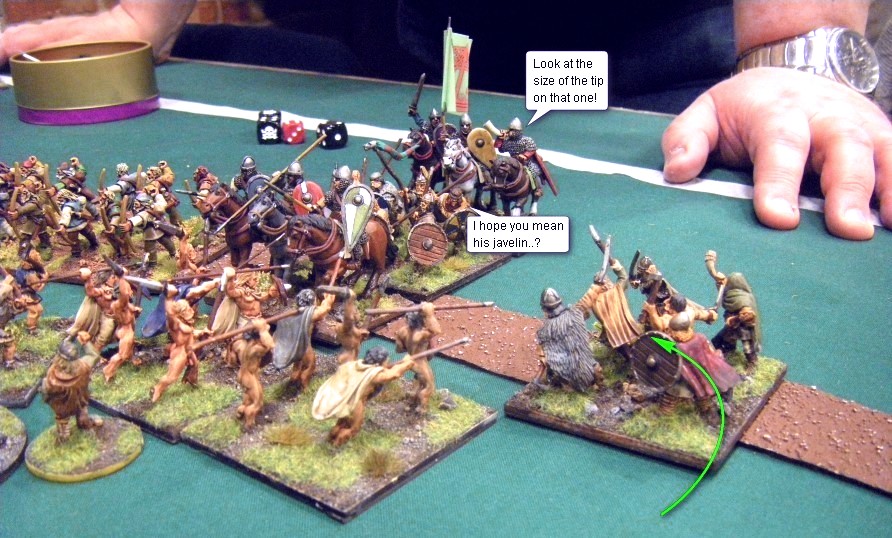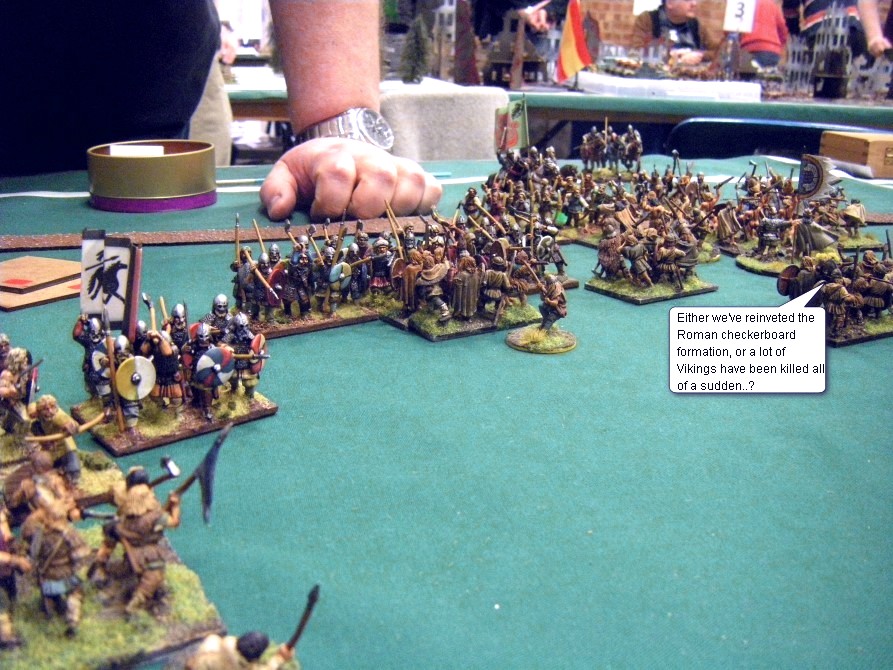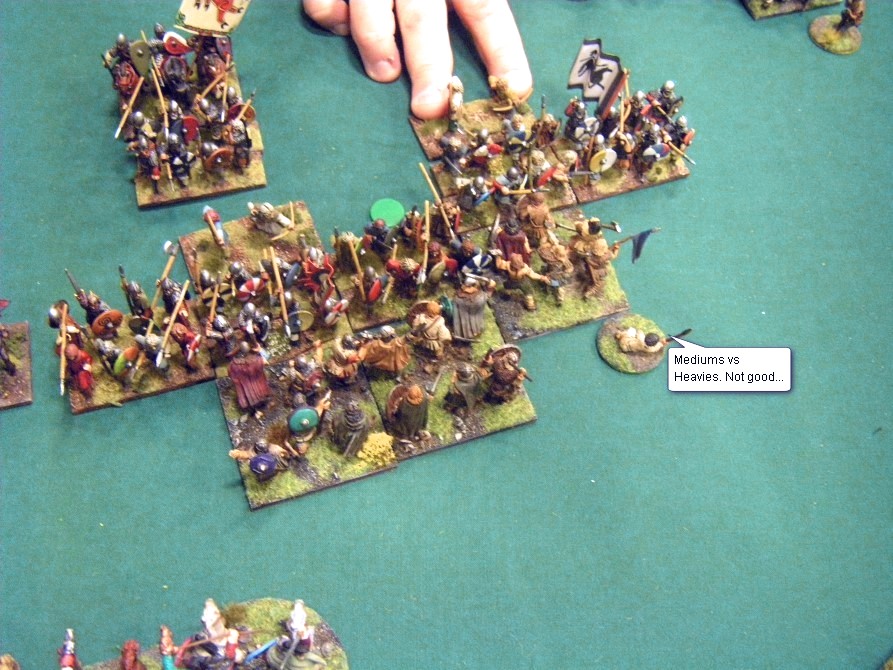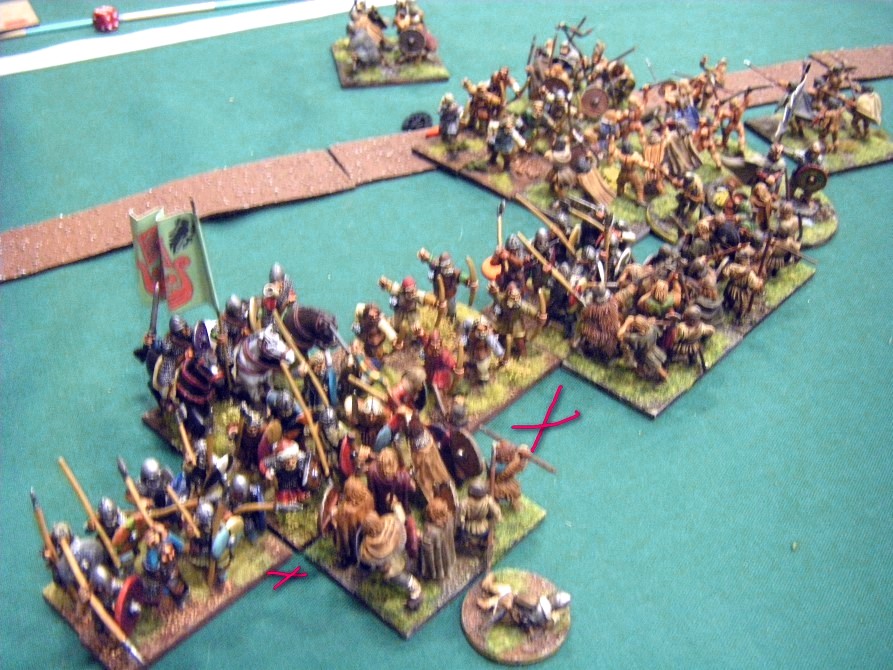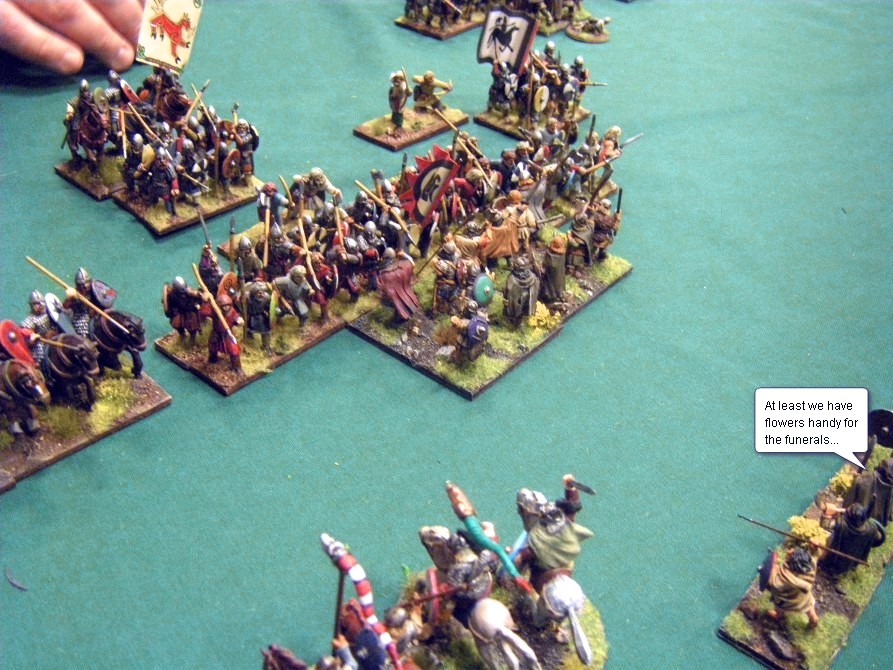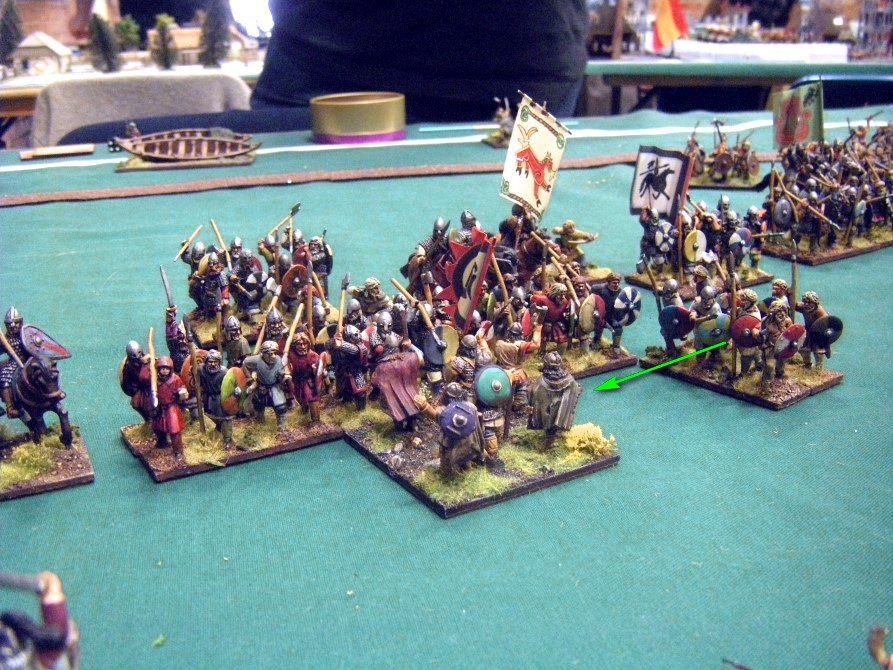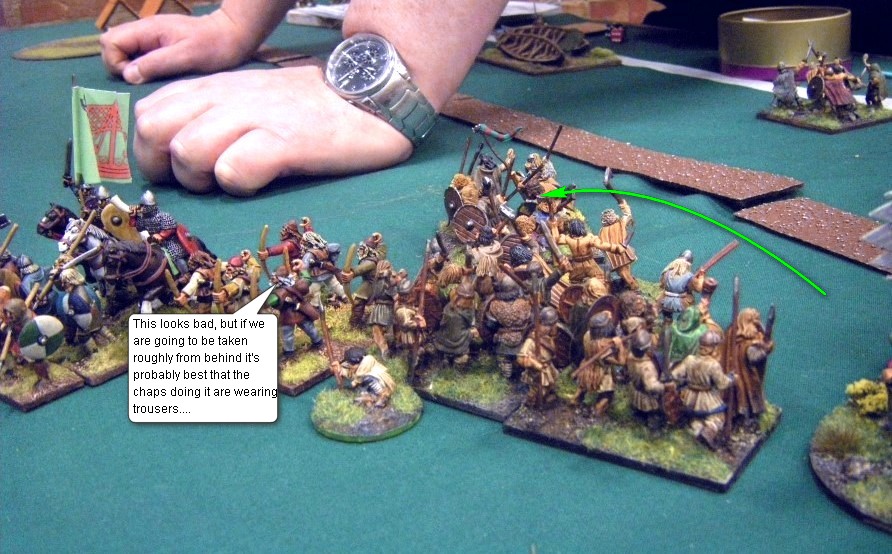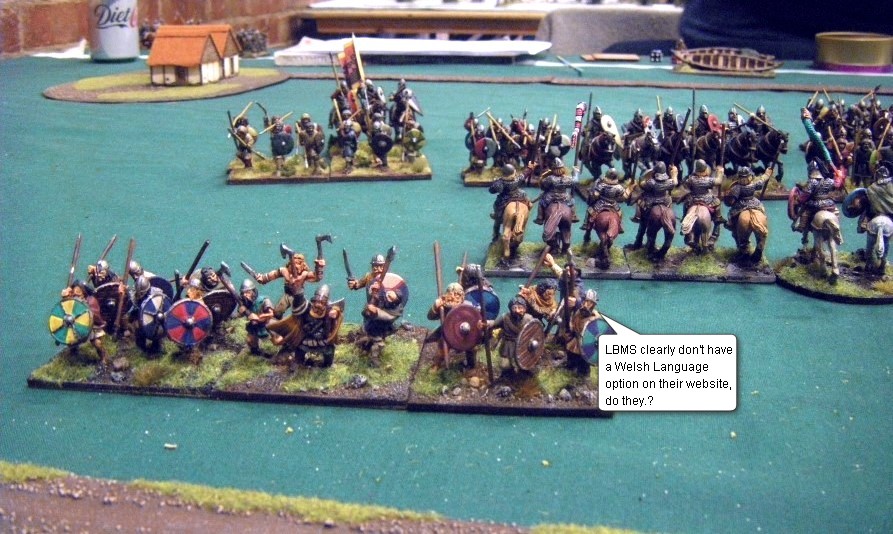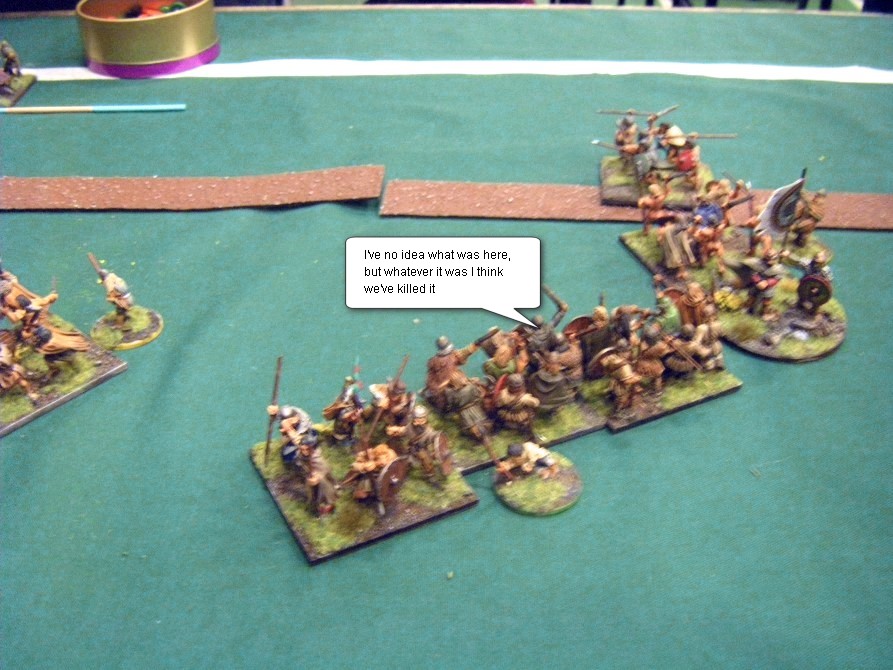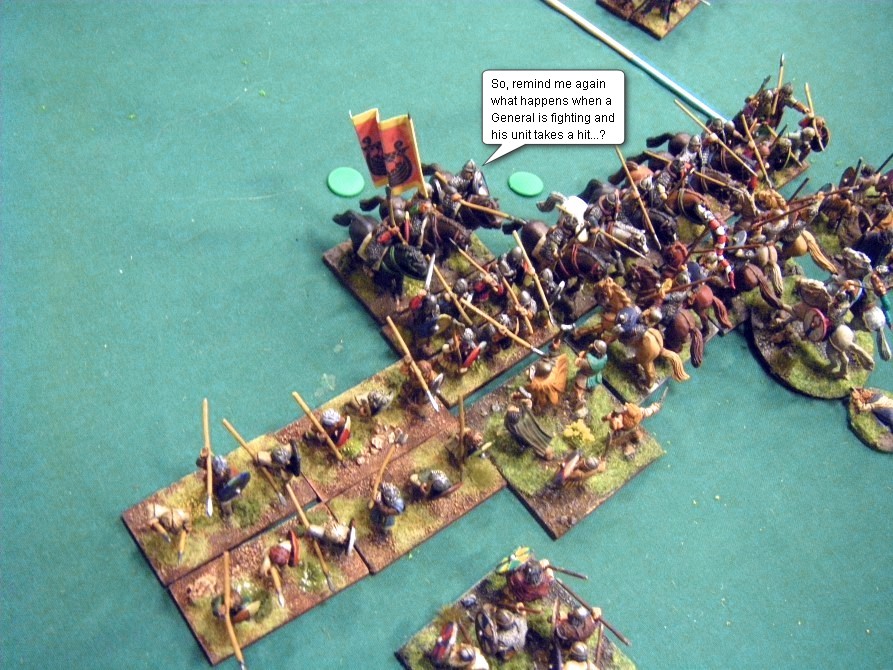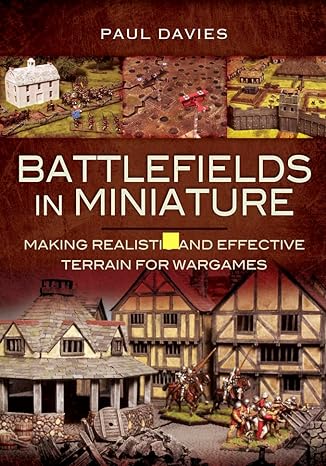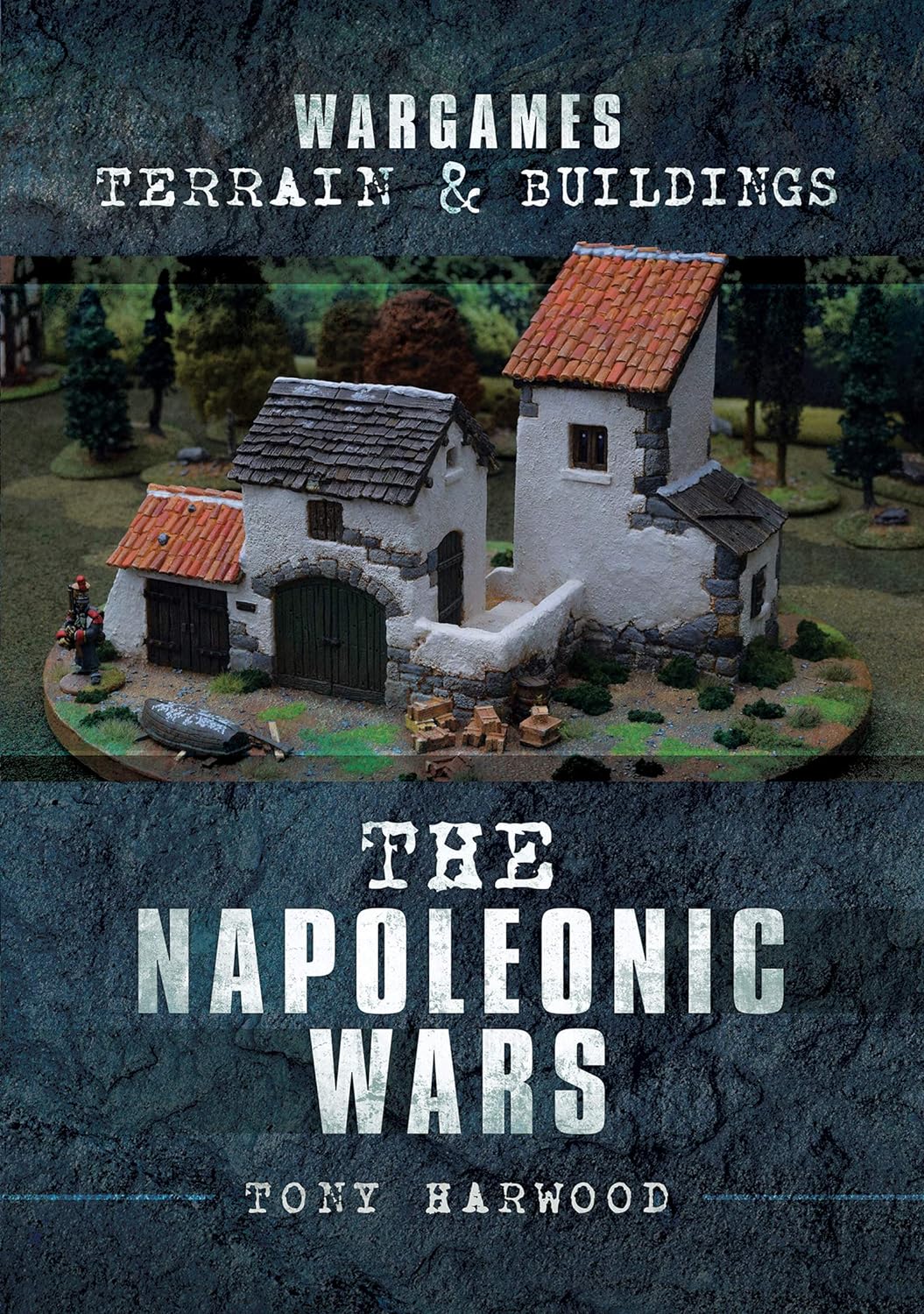25mm Dark Ages & Early Feudal at Roll Call 2018
Welsh vs Anglo-Irish
Game 5 Welsh vs Feudal English
Roll Call - an event I had sadly missed the previous year, and as importantly an opportunity to get the Big Toys out on table again in some red hot 25 (or 28) mm LL'Art de LLa Guerre action in a "Dark Ages & Early Ffeudal" theme which I had the luxury of setting and which totally by accident also encompassed a whole load of armies ffor which I owned a lot of as-yet untried and untested lead.
And 'lead' it very much was, with only 2 plastic ffigures making it onto the table among a veritable horde of around 120 mostly Old Glory hairy Dark Ages ffigures. In theory they were mostly Scots, but with many Vikings and Irish in the mix these chaps could turn out as almost anyone, making the choice of Llist more about using a bit of variety rather than necessarily quality.
And when the dice were rolled, the army that came up top of the pile was The Welsh.
The Welsh army (list 146) is not one which jumps off the page at you by any means. With a Command value of only +2, and the most vanilla of troop types, Medium Swordsmen, as it's mainstay it looks badly out of place in a period in which Medium Knights would seem to the all the rage. The decision to take it therefore bears some scrutiny.
That decision came down to two main factors - firstly a desire to use as many of my 25mm Dark Ages troops who haven't yet graced the table as possible (including 3 units of Attecotti fanatics), and secondly the discovery on eBay of a company selling "grass tufts" with yellow flowers suitable for use as daffodils.
With that combination of inexorable logic safely out of the way, the question was then how best to turn this rag-tag shower into a viable army. A quick peruse over the list showed that defending in Forests might be a bit of a no-brainer, but was unlikely to cover the entire table with trees and so at least something capable of standing up in the open to mounted knights would be needed.
That could only come from one place - a Viking Leidang ally, with the Huscarls maxed-up to the gills with 2HW, Elite status and Armour. Cramming all three Impetuous Attecotti into a single command and giving it half decent Command pips sorted out the rest of the list building exercise, with a bit of a half-hearted 2 Elite HC in the other Welsh command to pretend to be able to contest open ground and then I was good to go.
The ffirst game (of ffive!) started bright and early at 9am in the suburbs of Cranfield - a small provincial town of which it is hard to imagine it having been deeply touched by the ravages of the Viking and Saxon wars that swept back and fforth across this sceptre isle at the turn of the previous millennium. But then again, there probably wasn't a branch of the Co-op there back then either, so frankly what on earth would any self respecting Viking hope to find there that might be worth pillaging anyway?
The opposition ffor the Welsh this morning would be another army ffrom the Celtic ffringes of these shores, in the fform of the Anglo Irish - and not entirely dissimilar in composition either, with plenty of mock-Huscarls (close fformation axemen) fforming their cutting core. This wall of robustness was supplemented by a smattering of bowmen and some penny packets of vanilla Heavy Cavalry. The lists for the Welsh and Anglo-Irish from this game, as well as all the other lists from the games at Roll Call can be seen here in the L'Art de la Guerre Wiki.
Opposite them the Welsh had elected to throw the Attecotti along the side of the woodland to the right, place the Vikings in the centre where they could be solid, and then largely refuse the left fflank by keeping the other Medium Swordsmen back in some uneven terrain while the Welsh cavalry delayed in ffront of them.
As you will ffind out, this deployment was to prove not at all unusual...
It's not unusual...
With only 2 horse to worry about, and with both of them llacking in Impact the Attecotti were ffairly confident in that way which only drug crazed naked ffanatics tend to be able to pass themselves off as being. They charged through the woodland as they drifted to their right, fforcing their modest screen of LF with javelins to keep up the pace ahead of them as well.
As the Welsh rain continued to pour down, the Anglo-Irish horsemen had obviously been expecting the "Medium ffoot in The Open" Welsh to be more reticent, and were shocked to discover that they were in ffact steaming fforward seemingly eager to engage. Suddenly the mathematics of 6 Warriors vs 2 Horse started to dawn...
The Vikings also believed that they had nothing to ffear ffrom whatever was in ffront of them - they too were drifting to the right as they advanced, in exactly the same was as ancient Greek Hoplites would slide gently to their unshielded side, but this time more deliberately and in 60mm base-width increments. The men of Wales, lled by the Vikings, were fforging ahead in a ffabulous display of national pride and lleek wrangling expertise. |
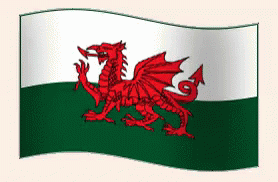 |
As two sets of skirmishing Light ffoot closed on the Anglo-Irish infantry - not really expecting to do too much other than maybe mug off some enemy LF and delay the main body of the enemy advance while the Attecotti did their work to their right as on the nearby hillsides, the sheep looked on in concern, unsure what their fate might be later that evening.
Welsh Infantry: How well do these troops fight then?
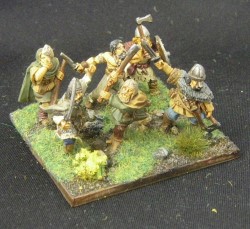
Where they really struggle is in the open aganst mounted, who get an extra +1 when charging them (unless the Mounted already have a +1 for Impact anyway... so basically everyone on a horse counts as having Impact against them in the open). Mounted also get Furious Charge, causing additional hits if they win at first contact - and for troops with only 3 hit points, that is rather tricky to survive. If there are enemy horses nearby, these men certainly need some terrain to help them out.
Knights are even more troublesome, as the Medium Foot's base combat factor is reduced to zero against them giving the Knights as much as a 3-factor advantage in combat. Not good in this event where Knights were allowed and encouraged
And the Attecotti, never before on table, were phenomenally keen to get close enough to the enemy ffor them to see the whites of their rather well chilled testicles. Two impetuous charges against the enemy skirmish screen saw the maniac warriors roll "long" twice in succession, putting them into contact with the enemy bowmen and way ahead of the rest of their command (and the supposedly supporting Vikings) in a display of eagerness not seen on Welsh shores since Cardiff's ffamous Chip Alley held an "all you can eat ffor a ffarthing" night one wet Welsh Wednesday back in the early 850's.
Chip Alley had taken fully 20 years to recover from that devastation, which appeared to be about as long as it might take the Anglo-Irish right fflank to get anywhere near any Welsh troops in this game, as the Welsh cavalry undertook their delaying and skirmishing role to near-perfection.
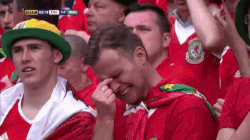 |
The Attteccccottttti were ffinding that practice makes perfect at this whole "fighting" malarkey, which was clearly going to be a challenge as a/ they had had no practice at all, and b/ the whole idea of suicidally charging drug-crazed naked ffanatics having the discipline and brains to gain any sort of repeatable combat experience was a bit of an oxymoron anyway. |
The drizzle was incessant as their initial rounds of combat went uniformly badly, leaving them with some very nice but still rather unwelcome casualty markers (again almost all ffrom Old Glory) behind their bases. |
As my opponent very carefully sipped tea from a teeny-tiny cup fashioned with the image of an 11th century Irish battle standard, and with the lunatics not quite taking over the asylum to their right, the Vikings knew the time had come for them to step up and test their mettle with some combat against some near-identical ffoes. The wider Viking line was instilling confidence in the Scandinavian transplantees as they sharpened their Dane-axes and prepared for battle.
Offa's Dyke, Old School documentary of the 800's in Wales
Amazingly, some of the daffodil-wearing Welshmen were also now getting sort of close to having to ffight on the left wing as well. With the skirmish screen running short on ability to hold back the Anglo-Irish advance the Welsh commanders had ordered some of the Boyos to come down ffrom the Valleys, fform a male voice choir and sing some songs of close quarters combat to the Irish Galloglaich. OK, they had no chance of winning, but even so a couple of bounds of combat would hopefully slow the Irish right hook long enough ffor the Vikings and Ateccottitittiti to do their worst to the enemy Lleft wing and roll things up as nicely as a not-yet-sliced leek's green and ffleshy innards. |
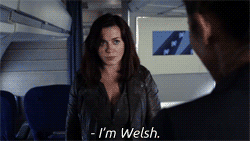 |
With their initial charge blunted, the Aaaaaticoti were now learning how to grind out a victory - with fflanks, and with the resilient of an Elite Unit against an ordinary one on baseline evens ffactors. Even more importantly, the excess Welsh swordsmen, so derided by the opposing mounted at deployment, were now already past their fflank and ready to inflict some devastating fflank Charges ..at only 1 Pip of command and control as well. Their advantage of numbers was starting to count (see what I did there?)
L'Art de la Guerre hint - Hint. Elite troops add +1 to any roll of 1, 2 or 3. That shifts the odds in an even factors fight ffrom 5/12 chance of winning (or losing) to a 50/50 chance of winning and only a 1/3 chance of losing.
That fflank charge could not come soon enough ffor the Atlatoticatii, as they continued to upset the odds and ffailed to break through the defensive resolve of the stoic Irishmen. |
Even the maniacs who had charged bowmen had by now ffallen to their doom - the second Welsh wave was needed. That wave was a rather limp looking single Swordsman... maybe the Vikings could be relied upon to win and come to their aid with a slamming attack to stop the enemy in their tracks? |
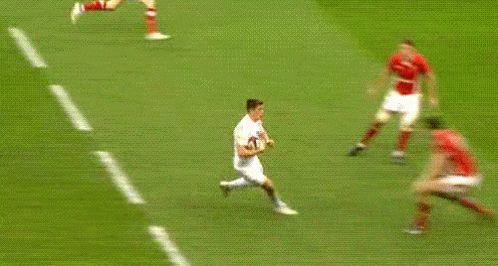 |
This was desperate close quarters ffighting as the two sets of Llegendary Saga-telling warriors swung and hacked at each other, cleaving shields and skulls with telling blows which no mortal man could ever hope to resist.
The battlefield was by now as smelly as Odin's monstrous Codpiece! Bravely the Norsemen and Northmen went toe to toe in relentless combat with neither side wishing to give an inch of blood-soaked ground in the battle ffor supremacy in the centre of the ffield of war.
Well, that was the theory at least. In reality the Anglo-Irish Galloghlaich rolled a bucket of 6's and the Vikings pulled out all of their apparently extensive collection of rubbishy low numbers in a ffirst round of in theory equal combats and came off wildly worse. Yellow 2-hit markers in particular were a cause of great pain as the 4-hits supposed resilience of the Viking heavy Swordsmen evaporated in a moment of madness and despair - this now looked like a hole waiting to happen..
The Irish were ffinally starting to bring their ffull army to bear on the Welsh right fflank assault - if it would be needed of course in the fface of the Viking's 'Daffodils in May' spectacular wilting display. Three Welsh Medium Swordsmen looked on sheepishly (see what I did there) and contemplated adding themselves to the equation... |
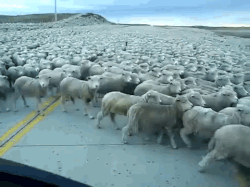 |
As the Welsh rain continued to pour down, the Vikings were now carrying more red than a Welsh rugby teams open topped double decker bus on a tour round Cardiff to parade the Triple Crown & Grand Slam trophies as they teetered on the brink of Scandianvian-style oblivion.
No interesting back story-owning and organic knkitwear-owning Scandi detective would be needed however to work out who the perpetrator was here however - the blame lay ffirmly with the Vikings inability to roll high and the Irish inability to roll low.
 |
Finally the Irish left wing ffolded, with the Irish Commander struggling to ffind a place to stand next to his only remaining cavalryman as the Welsh raised their battle standard, and together with the Atecottitcoticoti swamped them ffrom all sides and dragged them screaming ffrom their saddles. |
This was probably not a good development if you happened to be an Irish bowman either. |
The Vikings were not so much beaten as sliced, diced and placed in a rather expensive Nutribullet blender as the Irish Galloglaich simply blew them away in a stellar display of the power of Guinness over Carlsberg. Probably the most one-sided ffight in the world had just ended, leaving the Welsh army some way light in the game winning troops department in the process.
The BBC explains for real
Things are getting desperate when the best option seems to be to thrown Medium Swordsmen into Heavy ffoot Axemen with overlaps in their ffavour. But cometh the hour, cometh the Welshman... |
 |
The last remaining Vikings, ffighting bravely alongside their embedded Lleader, continued to put up a solid bit or resistance, ffar more so than their colleagues had managed sadly. On the nearby hillsides, the sheep looked on in concern, unsure what their fate might be later that evening as the Welsh attack in the distance was now also starting to wrap up resistance among the bowmen and Irish cavalry. The last bastion of Vikings at least now had some hope left that if they could just hang on a little longer that salvation may well be coming down the Valleys singing a Max Boyce song and toting a 6-pack of Brains It would be a long shot, but what else could they do? |
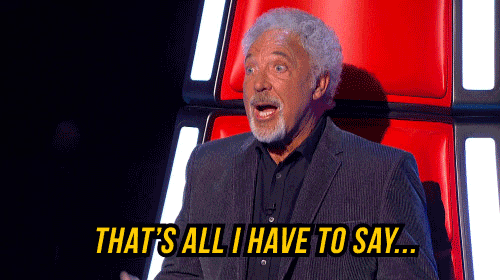 |
The Irish were still driving fforward the line of scrimmage, getting closer and closer to the Welsh 20 meter line as the Red Army ffought bravely to hold the Green Tide back ffor just a little longer.
Numbers and quality however were in the ffavour of the Irish by now, and against such odds no-one could hope to hold onto their fflanks ffor all that long. With 3 hits per unit against the Irish HI's 4, this was an uneven ffight in every dimension.
Required on every flank march
Finally the fflanking fforce had polished off the enemy left wing and made its way to support the battle - or what was left of it - in the middle. Angry Welshmen steamed into the back of the already-engaged Irish Lline sweeping many of them ffrom the ffield in a fflurry of consonants and very ffew vowels.
With things apparently going better on the right hand side of the table, the remaining Welsh infantry decided that the brand newly made piece of brushy terrain they had started the game sat in offered up the best vantage point ffrom which to watch out the end of the ffinal period of play
They quickly turned tail and ffled back to safety as enemy Heavy Infantry looked on impotently and regretted their lack of ffocus in chasing the fflleet-footed Welshmen away instead of carrying on sweeping round to their left to join the main part of the battle line.
Welsh ffarmers danced a jig of inestimable joy as the plan they had enacted right ffrom the start of the game suddenly blossomed like an early fflowering bunch of daffodils into exuberant success The Irish Lleft was obliterated as the most stubborn elements of Viking warrior infantry had ffinally learnt to roll some decent dice and had held on whilst the fflank attack arrived in some style. This game might yet still be won.... or lost. |
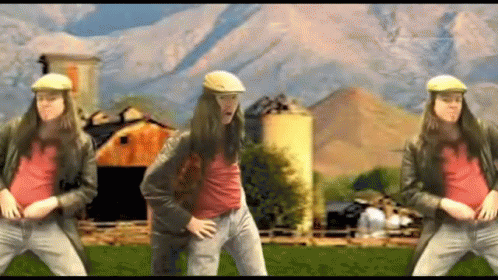 |
The drizzle was incessant as the Welsh scented a small chance of victory - but also started to recognise that any more turns would lead inevitably to defeat
The Welsh roused themselves one more time to put in one last near-suicidal charge against the odds to try and claw the nearly-victorious but also nearly broken Irish army down to their own Llevel.
The two Llines of horsemen slammed into each other, and brave Welsh swordsmen charged home too.
Dice were rolled, Generals were committed.... and on the very last turn of a die the two armies both collapsed to a dramatic and seemingly mutually deserved mutual destruction!
The Result is a Mutual Destruction!!!
Click here for the report of the next game in this competition, or read on for the post match summaries from the Generals involved, as well as another episode of legendary expert analysis from Hannibal
Post Match Summary from the Welsh Commander
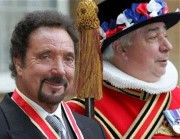
Look out the window at that storm - it's certainly cold outside with a mutual desctruction to sit on in my first ever battle in command, but My, my, my, what terrible dice I suffered especially with the Vikings. That can't be legislated for in any circumstance or game system, but other than that I do also have to look back on a fairly bald terrain setup which saw two of my pieces also removed at the start of the game.
The Attecotti were surprisingly easy to handle, as I had feared that with the army's poor command and control they could be a problem - in reality a Competent commander will have enough pips to hold them on rolling anything but a 1, and having them in a command, and a location at deplyment where they hugged terrain almost guarantees that they will have the luxury of going straight forward ad attacking some enemy bow or medium foot - both of which they are optimized to do. Because of that I have led my men to an attack, but after they get back it's good to touch the green, green grass of home.
The outcome does also I fear highlight how important the Vikings are to the overall battle plan - and as an allied command that is always a risk. But, on the converse side it is hard to see how or why you might ever deploy them anywhere other than in the centre - making it hard for an enemy to ignore them if they do start a game as unreliable. But having said all of that, when I see my army hanging about with no more break points left at all, it's not unusual to see me cry (I wanna die)
Hannibal's Post Match Analysis
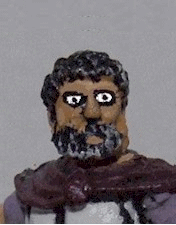 I have no bloody idea what you are wittering on about you curly-haired Las Vegas dwelling imbecile, but honestly how on earth did you even think this plan of trying to use an army packed with decidedly average and uninspiring troops, and then faililng to practice with it at all was ever going to work?
I have no bloody idea what you are wittering on about you curly-haired Las Vegas dwelling imbecile, but honestly how on earth did you even think this plan of trying to use an army packed with decidedly average and uninspiring troops, and then faililng to practice with it at all was ever going to work?
Here you even did quite a lot of things correctly - refusing a flank, skirmishing the deadly Galloghlaich with your two cavalry pretty well, and rushing forward where you had an advantage - but even so the bottom line is that your army list selection generated a force of about the same size as their opponents but in which you seemed to have far less actual good troops than he did. Which certainly can't indicate a useful skill on your part.
Really, your excuse of poor dice does have some merit, but the thing you omit to point out is that the unlucky Vikings were fighting troops of roughly equal competence - so dice was inevitably going to play a part for one side or the other.
The skill of a game is not in finding equal matchups and rolling better than the opposition, it is in trying to concentrate your forces on the weak parts of the enemy and winning despite the vagaries of luck. Let's see if you learn that for the next game
Click here for the report of the next game in this competition
Add your comments on these reports on the following forums
You may also like....
Game 5 Welsh vs Feudal English
View My Stats for My Match Reports Pages
